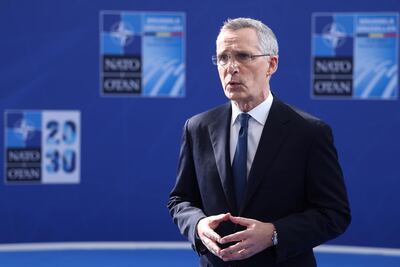Nato leaders toughened their stance on China and warned of threats from Russia at a summit on Monday.
Leaders said China's military expansion and assertive behaviour posed "systemic challenges" to the alliance.
It was the first Nato summit for US President Joe Biden, who assured allies of Washington's support for the organisation after relations soured during Donald Trump's presidency.
Warning of new challenges faced by the bloc, Mr Biden said: "We have Russia that is not acting in a way that is consistent with what we had hoped, as well as China."
The final communique highlighted China's military expansion, assertive behaviour and use of disinformation.
With an eye on foreign hackers, it said that Nato's Article 5 mutual defence guarantee could be used in the event of a cyber attack.
A significant cyber attack "might, in certain circumstances, be considered as amounting to an armed attack", it said.
On Russia, the communique said there could be no return to "business as usual" with Moscow until it complies with international law.
"We will continue to respond to the deteriorating security environment by enhancing our deterrence and defence posture," it said.
Mr Biden described the mutual defence pact on Monday as a "sacred obligation" for Washington, turning his back on Mr Trump's America first agenda.
"Nato is critically important for US interests," he said at the Brussels summit. "If there weren't one, we'd have to invent one."
Nato leaders consulted Mr Biden before his meeting with Russian President Vladimir Putin in Geneva, Switzerland, on Wednesday.
Russia was blamed for the SolarWinds cyber attack last year which hit government computer systems in the US.
“Our relationship with Russia is at its lowest point since the end of the Cold War,” Nato Secretary General Jens Stoltenberg said.
"Nato remains committed to our dual-track approach of defence and dialogue. We will keep our defences strong while remaining ready to talk."
UK Prime Minister Boris Johnson said Britain was willing to seek closer relations with Russia, but said his message to Moscow was: "You've got to change the way you behave".
"I'm always hopeful that things will improve with Russia, but I'm afraid that so far it's been pretty disappointing from the UK point of view," he said.
On China, Mr Stoltenberg said there were issues such as climate change and arms control where Nato could engage with Beijing.
“But China’s military build-up, growing influence and coercive behaviour also pose some challenges to our security and we need to address them together as an alliance," he said.
US National Security Adviser Jake Sullivan described China as featuring in the communique in a “more robust way than we’ve ever seen before”.
Nato on Monday began the process of revising its Strategic Concept, last updated in 2010, to address modern challenges.
The 2010 document called for a "strong and constructive partnership" with Russia and did not mention China.
The new strategy document will be prepared for leaders to adopt formally at the next Nato summit in 2022.
Mr Biden's trip to Brussels comes after four days of diplomacy at the G7 summit in Britain, where he met Mr Johnson and agreed on plans to distribute Covid-19 vaccine doses around the world.
G7 leaders called for the World Health Organisation to hold a new investigation into the origins of the disease.
Mr Sullivan said there was no consensus at the meeting on whether the infection spread to humans from animals or leaked from a laboratory.
G7 leaders called on China to respect human rights in Xinjiang and Hong Kong.
They also called on Russia to stop its “destabilising behaviour and malign activities”, including interference in elections.


